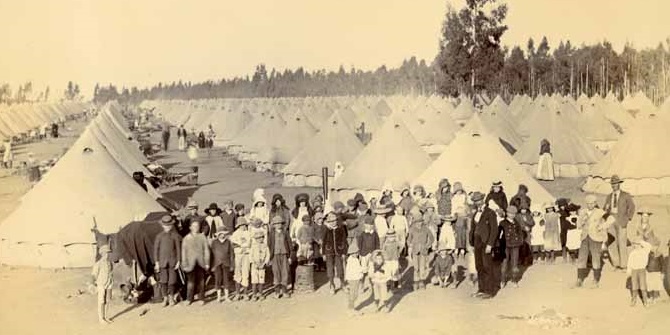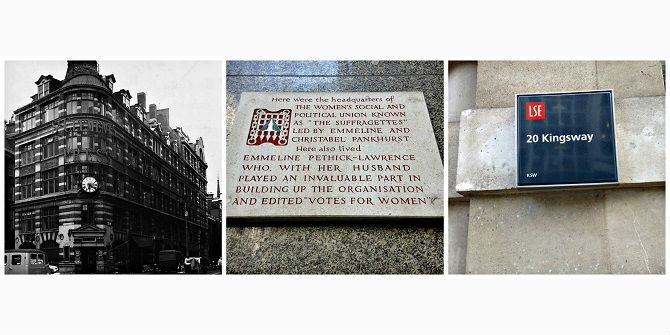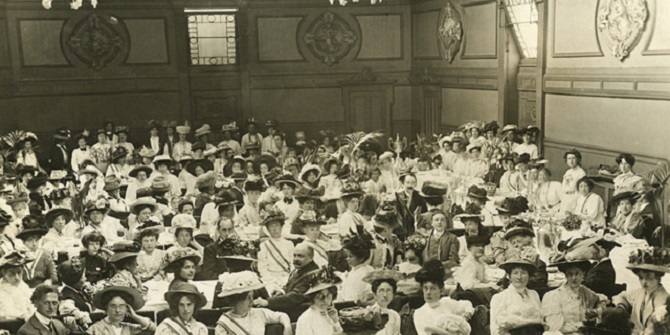In 2018, to mark the centenary of partial suffrage in Britain, the Towers at Clement’s Inn on LSE campus were renamed Pankhurst House, Fawcett House and Pethick-Lawrence House after three key suffrage campaigners with specific connections to LSE. In this repost from the LSE Review of Books, Melissa Terras and Elizabeth Crawford reflect on the importance of feminist digitisation practices for editing “Millicent Garrett Fawcett” – available open access from UCL Press– a new collection of writings by this leading UK suffragist and campaigner.
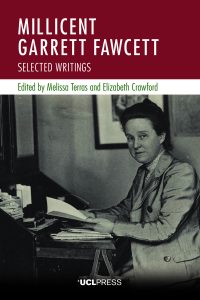 Millicent Garrett Fawcett (1847-1929) has once again been recognised as an important figure in modern feminist culture. Her statue in Parliament Square was unveiled in 2018 to celebrate 100 years of some women in the UK becoming entitled to the parliamentary vote. The statue bears a placard declaring “Courage calls to courage everywhere”, a phrase which has become the most famous aphorism attributed to this leading UK suffragist and campaigner of the late nineteenth and early twentieth centuries. However, when one looked for the source of the quote, it was nearly impossible to find.
Millicent Garrett Fawcett (1847-1929) has once again been recognised as an important figure in modern feminist culture. Her statue in Parliament Square was unveiled in 2018 to celebrate 100 years of some women in the UK becoming entitled to the parliamentary vote. The statue bears a placard declaring “Courage calls to courage everywhere”, a phrase which has become the most famous aphorism attributed to this leading UK suffragist and campaigner of the late nineteenth and early twentieth centuries. However, when one looked for the source of the quote, it was nearly impossible to find.
Fawcett’s contribution to society has likewise become hard to quantify. Understanding and contextualising her arguments, views and ideas have been difficult for anyone wishing to know what the person represented by the statue actually achieved. At the start of the 20th century, Fawcett was one of the most famous women campaigners in the UK, but by the early 21st century, her achievements were, if not forgotten, then not entirely understood. The last scholarly book to be written about Fawcett was published in 1991, and no collection of her germinal speeches, pamphlets and newspaper columns has been attempted – until now.
There are various reasons for this. The UK copyright for published works authored by Fawcett expired in 1999, 70 years after her death, and so it would have only been legally possible to create a compilation of her writings – scattered across various international publications – relatively recently. However, there were also the issues of complexity and range, and of accessing often ephemeral sources.
Given she spent 61 years campaigning in the public eye across a variety of topics, Fawcett produced a vast range of writings (Fawcett read out her speeches and rarely digressed from prepared material). The topics she covered centred upon the campaign for the Vote for Women, but also on the provision of education for women; feminist history; her love of literature (and Fawcett’s own attempt at fiction); purity and temperance; the campaign against employment of children; the British Army’s approach to the South African War; the Unionist cause against Home Rule for Ireland; and the role of suffrage organisations during World War One.
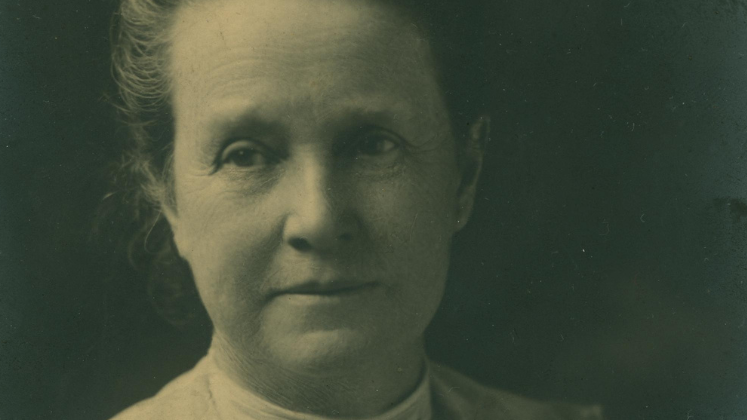
It is difficult to get a sense of Fawcett’s stance on all of these topics without tracking down hundreds of articles, newspapers and pamphlets – and many sources were scattered in various archives and special collections, in both the UK and beyond. Only an ambitious (yet unfunded) plan to hunt within mass-digitised content and to undertake digitisation-on-demand for sources which were not yet digitally available allowed us to locate and synthesise all of Fawcett’s writings that we could, including discovering a good few that had never been noted before in her bibliography.
From these writings, a selection was made of 35 speeches and articles as well as 22 artworks and photographs for our collection Millicent Garrett Fawcett: Selected Writings, telling the story of Fawcett’s contribution to modern society, over a span of 61 years, in her own words. It was apposite that a large number of sources in the book are from the Women’s Library at LSE: a collection which had been previously known between 1957 and 2002 as the Fawcett Library (the collections had come from The Library of the London Society for Women’s Service, formed in 1926, and with which Fawcett was linked before her death).
However, Fawcett’s written speeches and columns are – in places – not immediately intelligible to the 21st-century reader, containing as they do contemporary references to people, political events, news items, jokes and even songs and other forms of popular culture, which are remote to those reading them today. To explain the nuance, a vast array of digitised books, newspapers and other historical sources had to be repeatedly searched, tracking down remembered (and half-remembered) quotes, identifying politicians only referred to as “The Honourable Gentleman” and explaining audience laughter at phrases which are now alien to us.
The work that went into this book – including its scale and close attention to detail – would not have been possible without the digitised information environment as well as access to both commercial and openly licensed digital cultural heritage. The timing of the compilation of this collection, too, was coincidental in only having access to digital resources: although we had luckily collected Fawcett’s writings before the COVID-19 pandemic, the write up and analysis happened at a time of social distancing, when physical access to most libraries and archives was impossible.
This book is also an example of how to correct issues in the 21st century information environment. Given there had not been any accessible overview of Fawcett’s contributions, initial coverage of the 2018 statue grasped for and named sources which did not actually exist. We methodically searched for dates for popular photographs, which are often circulating online without proper context or source, and we meticulously documented the relationship of Fawcett’s published text to her contemporary print environment, providing a trusted resource for others wishing to put Fawcett’s thoughts and actions in context. The book also shows how current Fawcett’s arguments still are, particularly on inequalities between men and women; societal and institutional approaches to violence against women; the need to fight for equality in education, employment and equal pay; navigating prejudices; and confronting the double standards by which women are judged.
Millicent Garrett Fawcett: Selected Writings is therefore an example of how digital cultural heritage can be used to enhance the understanding of individuals who have not previously been centred in modern academic inquiry. Feminist digitisation practices in libraries and archives – those which centre women’s lives and their histories, taking ownership of information that has not been covered by institutionally supported digitisation or funded initiatives – can be a way to resurface feminist voices, biographies and contributions to society. The combination of using digitisation to find, source and gather material, and using mass-digitised content to understand and interrogate it, allows new, broader histories to be compiled. The digital information environment also allows these histories to be shared: we are pleased that Millicent Garrett Fawcett is available for free download via open access from UCL Press. Millicent Garrett Fawcett’s words changed a society: digital means were able to gather, understand and share them, so that her words can be read again, and understood, freely, by all.
This post was originally published on the LSE Review of Books blog.



